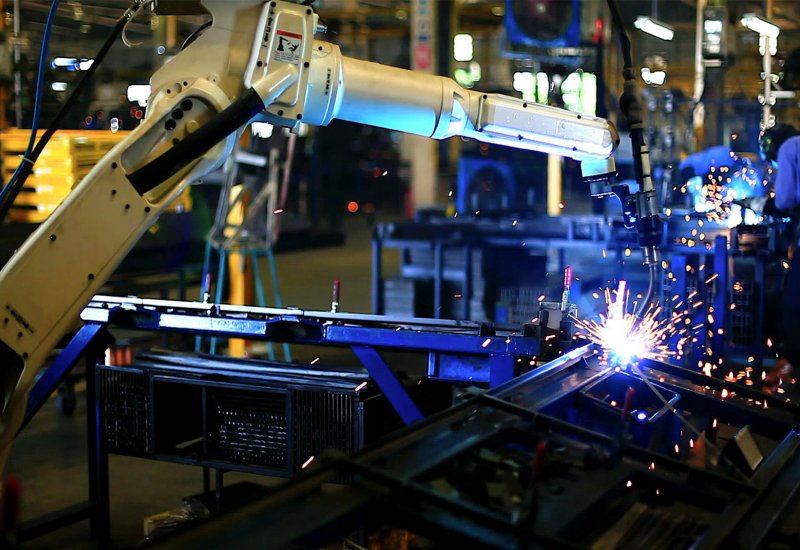
Robotech strategy - April 2023
- 11 May 2023 (5 min read)
The resilience of our ‘Healthcare Applications’ theme supported positively the strategy performance
- Positive global equity markets performance but weakness from the technology sector
- US Leading economic and labour market indicators continue to show resilience
- We took profits on some semiconductor holdings after strong year-to-date performance
What’s happening?
Global equity markets extended their year-to-date gains in the month of April with the MSCI All Country World Index increasing 1.4%1 The Robotech strategy underperformed the broader market experiencing weakness from its technology sector exposure and in particular semiconductors and software.
The concerns within the banking system continued into April, culminating in the collapse of First Republic Bank at the end of the month, creating an overhang across the equity market, whilst the risk of a breach of the US Governments debt ceiling has become an additional cause of concern for market participants. Leading economic indicators such as the Purchase Manager Indicators (PMIs) continue to show resilience with the US Manufacturing PMI edging higher in April while labour market indicators continue to be robust.
Companies began to report their first quarter results and so far, these have been largely encouraging, suggesting forecast have been well judged, and possibly even conservative.
Portfolio positioning and performance
Our ‘Healthcare Applications’ theme provided the largest positive contribution to performance over the month with positive trends witnessed across both the sub-themes of Robotic Surgery and Digital Healthcare. Intuitive Surgical – a leader in robotic surgery – delivered a strong earnings report increasing their guidance for annual procedure volumes to 18-21% for 2023 (from prior 12-16%). Sequential improvement in staffing has allowed for some incremental procedures to be performed. Notably their Da Vinci robotic surgical systems are being used more hours per operating day and customers are increasing the mix of shorter duration. Dexcom, a leader in Continuous Glucose Monitoring (CGM) for diabetic patients, reported strong results benefiting from the growing momentum behind the rollout of their new G7 system – considered the most accurate CGM device on the market. Revenues beat expectations and more users were added over the first quarter 2023 than in any previous quarter in the company’s history. Full-year guidance was raised while the G7 system is planned to launch in 8 new international markets during Q2. In a further piece of good news for Dexcom, the Centers for Medicare & Medicaid Services (CMS) finalised its proposal to expand access for broader type 2 diabetes reimbursement using basal insulin only. This decision represents the largest single expansion of access to CGM in the history of the industry. Conmed (component supplier for surgical robots) produced better than expected results beating consensus numbers on revenues and earnings. The company benefited from a combination of tailwinds that are currently benefiting the wider MedTech sector - namely an increase in procedure volumes, staffing pressures easing and gradually reducing supply chain constraints.
Within the ‘Industrial’ theme, Kion (German company focused on warehouse automation solutions) published a positive pre-release of its earnings primarily due to its Industrial Trucks & Services segment which benefited from improving supply chain conditions. This led to full-year guidance being raised alongside margin improvement from both the easing of supply chain conditions and input costs (energy and steel). Its Supply Chain Solutions segment orders remain subdued but we are starting to see an increased number of data points across the ecommerce landscape signalling a stabilisation and reason for optimism. Fanuc, a leading Japanese robot manufacturer, reported increasing orders driven by its Robomachine and Robotics segments as well as indicating a normalisation of inventory levels for its factory automation orders in key markets such as China.
Within the ‘Technology Enablers’ theme, semiconductors were generally weak after a strong start of the year. TSMC had mixed results due to a slower end-demand recovery and higher than expected customer inventory exiting 2022. Encouragingly, the company indicated seeing some upside to AI (Artificial Intelligence) orders and confirmed that N3 (3 nanometres) demand continues to be ahead of supply suggesting a potential driver of growth in 2024. Silicon Labs (Internet of Things chips) results were in-line with expectations but inventory destocking and demand weakness resulted in guidance below consensus. China demand was a headwind but management noted encouraging signs of a potential recovery. Wolfspeed (a leader in Silicon Carbide based chips) reported positive earnings beating expectations, however, operational issues with delay in its Mohawk Valley facility ramp overshadowed these results and weighted on its share price. Aspen Technology, a US Software company focussed on process automation, was weaker after announcing a spending slowdown in the chemical end-market and longer than expected integration process with the recent Emerson transaction. Cadence, US Software company focused on software for semiconductor design, delivered a mixed report of results but raised its 2023 guidance with large customer software renewals occurring second half of the year. The company is well positioned to benefit from the increasing complexity in chip and integrated circuit design. During April the company announced its new Cadence Virtuoso Studio for custom analog design with management highlighting it now offers a comprehensive range of AI application tools necessary for development of the next generation of chips at 3 nanometres and below.
During the month, we added to the German company Kion and continued to build our position in the recently initiated Zebra Technologies, a US company that focuses on a range of technologies used in warehouse automation. An increasing number of data points are suggesting that the post-pandemic headwinds to ecommerce are starting to ease which provides greater confidence in modestly increasing exposure to this end market, a key driver to wider warehouse automation industry. We modestly reduced our holding in Taiwan Semiconductor (TSMC) and trimmed our position in both Nvidia and AMD taking profits following a strong period of performance year-to-date. We also continued to reduce our auto/industrial semiconductor exposure, trimming Infineon and exiting NXP Semiconductor. Commentary from some semiconductor companies suggested automotive inventory digestion may have peaked in Q1 and consequently leading to a slowing growth profile through the rest of the year.
Outlook
The environment remains challenging for investors as uncertainties over inflation, rising interest rates and now a banking crisis raises the concerns over the overall health of the economy. Whilst we expect macro-economic and geo-political events to continue to be the main drivers of sentiment within investment markets, we expect that some of these pressures might begin to abate as the current interest rate cycle appears to be closer to a peak given recent economic readings.
The labour market continues to be tight in many areas where continued labour shortages present a real challenge for businesses. For instance, in the manufacturing space or warehousing space, we see fewer workers – particularly younger demographics – that are willing to do these kinds of jobs, given the nature of the roles and the salary. As a result – facing labour inflation and labour shortages – companies are increasingly incorporating Technology and Automation in their processes to increase efficiency and productivity with their existing/shrinking workforce. In simple terms, we anticipate that labour shortages and wage inflation are substantial drivers of automation demand over the next few years. As labour costs go up, the payback periods become quicker from introducing automation, meaning that more and more areas are considered for automation.
The US is trying to reinvigorate its domestic manufacturing via infrastructure spend and capital expenditures (CAPEX). This is important politically as its US Jobs, important geopolitically as it keeps US intellectual property within the US and important for supply chain as its secure stock within the country after the disruption witnessed post-COVID. Government support has evolved over the past few years, whether it be the Trump Administration – with tariffs in the US China trade war – or more recently with the Biden administration and the CHIPS Act signed to ramp up and ‘reshore’ US technology such as domestic semiconductor manufacturing. US president Biden also passed the Inflation Reduction Act (IRA) allocating a lot of spend for more domestic US manufacturing, focussed on key technologies. As a result of tariffs, incentives and reducing the risk of supply chain issues, companies are investing again in the US and this comes with technological sophistication, robotics and automation.
- U291cmNlJm5ic3A7OiBCbG9vbWJlcmcgaW4gVVNEIGFzIG9mIDI4LzA0LzIwMjM=

Automation
Investing in automation and robotics - How are companies capitalising on robotics – and what does this mean for investors?
Find out moreVisit the fund centre
The Sub-Fund seeks to provide long-term capital growth, measured in USD, from a portfolio of listed equity and equity related securities, in line with a socially responsible investment (SRI) approach.
View fundsDisclaimer
Not for Retail distribution: This document is intended exclusively for Professional, Institutional, Qualified or Wholesale Clients / Investors only, as defined by applicable local laws and regulation. Circulation must be restricted accordingly.
Past performance is not a guide to current or future performance, and any performance or return data displayed does not take into account commissions and costs incurred when issuing or redeeming units. The value of investments, and the income from them, can fall as well as rise and investors may not get back the amount originally invested. Exchange-rate fluctuations may also affect the value of their investment. Due to this and the initial charge that is usually made, an investment is not usually suitable as a short term holding.
This document is for informational purposes only and does not constitute investment research or financial analysis relating to transactions in financial instruments as per MIF Directive (2014/65/EU), nor does it constitute on the part of AXA Investment Managers or its affiliated companies an offer to buy or sell any investments, products or services, and should not be considered as solicitation or investment, legal or tax advice, a recommendation for an investment strategy or a personalized recommendation to buy or sell securities. The strategies discussed in this document may not be available in your jurisdiction.
Due to its simplification, this document is partial and opinions, estimates and forecasts herein are subjective and subject to change without notice. There is no guarantee forecasts made will come to pass. Data, figures, declarations, analysis, predictions and other information in this document is provided based on our state of knowledge at the time of creation of this document. Whilst every care is taken, no representation or warranty (including liability towards third parties), express or implied, is made as to the accuracy, reliability or completeness of the information contained herein. Reliance upon information in this material is at the sole discretion of the recipient. This material does not contain sufficient information to support an investment decision.
Please note that the management company reserves the right, at any time, to no longer market the product(s) mentioned in this communication in a European Union country by notification to its authority of supervision in accordance with European passport rules. In the event of dissatisfaction with the products or services, you have the right to make a complaint either with the marketer or directly with the management company (more information on our complaints policy available in English here). You also have the right to take legal or extra-judicial action at any time if you reside in one of the countries of the European Union. The European online dispute resolution platform allows you to enter a complaint form (by clicking here) and informs you, depending on your jurisdiction, about your means of redress (by clicking here).
Issued in the U.K. by AXA Investment Managers UK Limited, which is authorised and regulated by the Financial Conduct Authority in the UK. Registered in England and Wales, No: 01431068. Registered Office: 22 Bishopsgate, London, EC2N 4BQ. In other jurisdictions, this document is issued by AXA Investment Managers SA’s affiliates in those countries.
Risk Warning
The value of investments, and the income from them, can fall as well as rise and investors may not get back the amount originally invested.